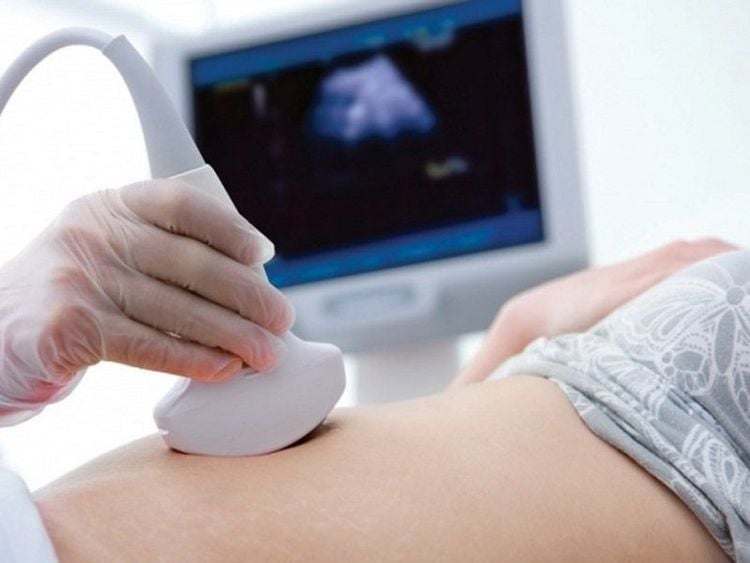Low amniotic fluid at any time during pregnancy poses potential risks to the fetus. Low amniotic fluid at the end of pregnancy is even more dangerous and requires early treatment to ensure the safety of both mother and baby. So what is low amniotic fluid at the end of pregnancy and how dangerous is this phenomenon? The following article will clarify these issues.
1. What is low amniotic fluid at the end of pregnancy?
Amniotic fluid is a solution that acts as a cushion between the fetus and the uterus, preventing the fetus from impacts and shocks when the mother moves. The amount of amniotic fluid will change and be maintained according to each stage of pregnancy to ensure the normal development of the fetus.
From the 20th week of pregnancy, the fetus will begin to swallow amniotic fluid and the amniotic fluid is reabsorbed through the fetus's skin, umbilical cord and amniotic membrane. Therefore, amniotic fluid is a circulating fluid. The volume of amniotic fluid when the fetus is 4-8 weeks old is 50ml and increases to 1000ml at the 38th week of pregnancy.
The phenomenon of oligohydramnios occurs when the fetus is full term, that is, from 38-40 weeks, the placenta ages and no longer secretes water, causing the amniotic fluid to gradually dry up.
2. How to know if a pregnant woman has low amniotic fluid?
Pregnant women with low amniotic fluid often do not have obvious symptoms and are often confused with signs of impending labor. If the fetus is large, the pregnant mother may see amniotic fluid leaking through the vagina, especially easy to recognize when wearing a sanitary napkin. This phenomenon is called amniotic leakage, and when a pregnant woman has amniotic leakage, the water will dry up very quickly.
To most accurately assess the condition of the amniotic fluid, the doctor will order the pregnant woman to have an ultrasound. In the ultrasound, there will be a mandatory index that must be measured, which is the AFI index (amniotic fluid index) or amniotic index. The doctor will divide the mother's abdomen into 4 compartments with 1 vertical line and 1 horizontal line, the amniotic cavity of these four parts added together will give the AFI index. For fetuses from 16-41 weeks old, the average AFI index is 12-16.
To most accurately assess the amniotic fluid condition, the doctor will order the pregnant woman to have an ultrasound

3. How dangerous is low amniotic fluid in late pregnancy?
Low amniotic fluid is very dangerous for the fetus, especially during labor. The fetus can be imagined as a ball in a water bag: if there is a lot of water, it is difficult to affect the ball inside when the bag is impacted; but if the water is depleted, the ball will be easily affected by light impacts from the outside. Low amniotic fluid quickly during labor is very dangerous, because at this time the uterus contracts strongly, squeezing the fetus, making it easy for the fetus to suffocate, causing fetal distress and a very high risk of death.
Therefore, for late-term pregnancies, if the ultrasound results show that the placenta is calcified or there is low amniotic fluid at week 38 or low amniotic fluid at week 39 or later, the pregnant woman needs to be hospitalized immediately for treatment. If the amniotic fluid level is less than 60ml, the pregnant woman needs to be closely monitored with a fetal heart monitor (obstetric monitor). In case of fetal distress, immediate intervention is needed with measures to terminate the pregnancy such as induced labor or cesarean section. At that time, the pregnant mother and her relatives need to prepare mentally and have their belongings ready for childbirth at any time.
Trắc nghiệm: Dấu hiệu cảnh báo chuyển dạ thực sự
Chuyển dạ là quá trình thai phụ bước vào giai đoạn “đẻ đau” để kết thúc thời gian “mang nặng”. Thời gian và dấu hiệu chuyển dạ sẽ khác nhau tùy vào vào từng người và nhiều yếu tố. Theo dõi bài trắc nghiệm dưới đây sẽ giúp bạn hiểu rõ hơn các dấu hiệu chuyển dạ một cách chính xác và an toàn.4. How to prevent low amniotic fluid?
Low amniotic fluid at the end of pregnancy or at any time during pregnancy also poses many risks to the life and development of the fetus. In some cases, the treatment will be very complicated and difficult to predict. Therefore, pregnant women should prevent low amniotic fluid early by implementing a reasonable diet and lifestyle as well as regular prenatal check-ups. Some notes for pregnant women to prevent low amniotic fluid are as follows:
It is necessary to ensure a balanced diet with 4 components including: Protein, starch, fat and vitamins (found in vegetables and fruits), pay attention to increasing protein for the fetus to develop well;
You should eat a lot of shrimp and crab because they are foods rich in calcium and protein, and can be combined with meats such as chicken, beef, eggs or fish
You should eat a lot of shrimp and crab because they are foods rich in calcium and protein

Supplement some necessary nutrients with medicine. The nutrients that need to be supplemented include:
Iron: The purpose is to prevent anemia due to iron deficiency;
Calcium: Helps prevent osteoporosis in mothers and helps babies have enough calcium to grow taller;
Multivitamins for pregnant women: Help mothers be healthier and reduce morning sickness.
Full tetanus vaccination for mothers and children when the fetus is 20 weeks old or older. The vaccination schedule is as follows: 2 injections, the second injection at least 1 month after the previous injection and at least 1 month before birth;
Full prenatal check-ups and pregnancy management.
Low amniotic fluid can occur at any time during pregnancy and is especially dangerous for the fetus during labor. Therefore, in all cases of amniotic fluid deficiency, pregnant women need to be hospitalized immediately for monitoring and timely intervention. If the fetus is full-term, a cesarean section is needed to ensure the safety of both mother and child.
For a smooth pregnancy, the role of regular prenatal check-ups cannot be underestimated, especially monitoring the health of the fetus will be more comprehensive if pregnant women choose maternity care packages provided by large and reputable hospitals.
The Maternity Care Program implemented at Vinmec International General Hospital is always highly appreciated among maternity care services in Vietnam. Vinmec has a team of doctors and nurses, selected with the strictest medical ethics and professional standards. Vinmec is also a hospital that always focuses on applying new and advanced medical advances in the world to examination, diagnosis and treatment of diseases, helping to effectively treat not only the phenomenon of oligohydramnios during pregnancy but also many other abnormalities in pregnant women.
Maternity techniques at Vinmec, whether simple or complex, are all strictly controlled, methodical, serious and highly responsible. In particular, the professional service quality, civilized and luxurious hospital space will make pregnant women feel most comfortable and secure, because Vinmec understands how pregnant women are the ones who need to be cherished and protected.
To arrange an appointment, please call HOTLINE or make your reservation directly HERE. You may also download the MyVinmec app to schedule appointments faster and manage your reservations more conveniently.








